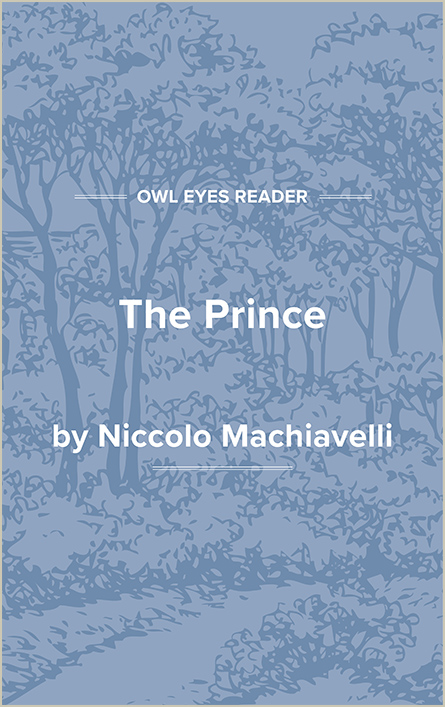Study Guide
Niccolò Machiavelli Biography
On May 3, 1469, Niccolò di Bernardo dei Machiavelli was born in Florence, one of four children, to Ser Bernardo Machiavelli and Bartolomea de’ Nelli. As the son of a rather poor branch of a noble family, Machiavelli later said that he learned to do without before he learned to enjoy what life had to offer. Little is known of Machiavelli’s early years other than that he obtained a typical but substantial bourgeois education, also taking advantage of the extensive library that his father Bernardo had taken pains to create. It is known that as a young man he began to study Latin grammar under the guidance of a tutor named Matteo, and by the time he was twelve years old he was composing in Latin under the supervision of Paolo di Ronciglione. The Latin influence introduced him to such authors as Livy, Tacitus, Pliny, and Cicero, as well as Ovid, Lucretius, and Vergil, with whom he felt more familiar than the Greek historians and philosophers whose works he read in translation. From 1488 to 1498, he worked at the Rome office of the Berti bank, and at the age of twenty-nine, after the overthrow of the Medici rule in 1494 by Girolamo Savonarola’s followers and the subsequent violent end of Savonarola’s republican government in 1498, Machiavelli began his political career when he was elected secretary to the Second Chancery of Florence. This position, although not of major importance, allowed Machiavelli to go on frequent legations to other cities and towns in Italy, as well as to other countries, such as France, Germany, and Switzerland. In addition, Machiavelli took on the position of secretary to the Dieci di Balia (the Ten of Power), a magistry that directed defense and diplomatic affairs. In 1501 or, according to some sources, 1502, he married Marietta Corsini, a devoted wife who eventually bore him six children.
In the course of his duties, Machiavelli’s political philosophy began to develop. He was greatly influenced by his travel experiences, and he analyzed the strengths and weaknesses of the foreign nations he visited on his return from his legations, as evidenced by his Rapporto delle cose della Magna (wr. 1508; report on the state of Germany) and his Ritratto di cose di Francia (wr. 1512-1513; portrait of the state of France), among other works. One of the greatest influences on Machiavelli, however, was the ruthless Cesare Borgia, who was attempting to create his own principality in Italy and therefore threatened the fate of Florence. Machiavelli was sent on legation to Borgia twice, and he wrote an account of one of Borgia’s brutal actions entitled Descrizione del modo tenuto dal Duca Valentino nello ammazzare Vitellozzo Vitelli, Oliverotto da Fermo, il Signor Pagolo e il Duca di Gravina Orsini (wr. 1503; on the manner adopted by the duke Valentino to kill Vitellozzo Vitelli, Oliverotto of Fermo, Sir Pagolo, and the duke of Gravina Orsini). Indeed, the methods of Borgia became the model on which Machiavelli based his idea of the prince, a ruthless, cunning ruler who would finally achieve the ultimate goal of uniting all of Italy. Machiavelli’s pragmatic observations had the immediate effect of persuading the chief magistrate of Florence to create a state militia in 1505. In 1506, he was sent by the Florentine government to Rome to meet with Pope Julius II, who was then pursuing an expansionistic policy. Toward the end of the same year, Machiavelli added to his official duties the secretariat of the newly created Chancery of the Nine Officials of the Florentine Militia.
Machiavelli’s political career changed course dramatically in 1512, when the Medici family returned to Florence after the defeat of the Florentine troops by the Spanish army led by Cardinal Giovanni de’ Medici, the future Pope Leo X. Not only did he lose his position, but in 1513 he was also briefly imprisoned and tortured after having been wrongly accused of participating in a conspiracy against the Medici rule. After his release, Machiavelli...
(The entire page is 1,032 words.)
Owl Eyes subscribers get unlimited access to our expert annotations, analyses, and study guides on your favorite texts. Master the classics for less than $5/month!

